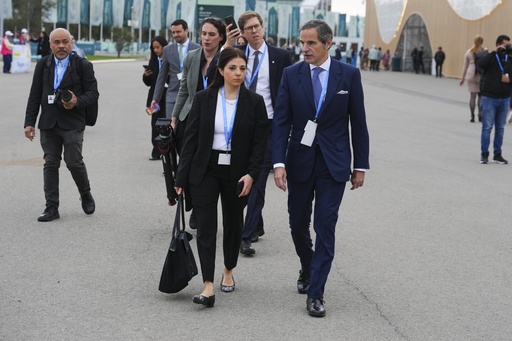
BAKU, Azerbaijan — The chief of the United Nations’ nuclear oversight agency expressed optimism on Tuesday that forthcoming discussions with Iranian leaders, including the newly elected president, may yield advancements in the oversight of Iran’s nuclear endeavors. This situation is particularly pressing as tensions have escalated in the region, highlighted by Israel conducting airstrikes on Iran on two occasions.
Mariano Grossi, who serves as the director general of the International Atomic Energy Agency (IAEA), is set to visit Iran on Wednesday for his inaugural talks with President Masoud Pezeshkian, who took office in July. Grossi mentioned that he aims to expand upon the constructive dialogue he previously engaged in with Iranian Foreign Minister Abbas Araghchi during the United Nations General Assembly in September.
“In this scenario, we face a significant issue that demands resolution,” Grossi stated in an interview at the U.N. climate summit in Azerbaijan. “This pertains to the existing gap and deficiency in trust, which we must prevent from evolving into a self-fulfilling prophecy where nuclear facilities become targets.”
He articulated the need to transcend the current strained relationship with Iran, describing it as a “dire straits dynamic.” The IAEA reports that Iran is swiftly progressing its nuclear agenda, augmenting its stockpiles of uranium enriched to levels close to that of weapon-grade material, in defiance of international requests. Iran, however, maintains that its nuclear pursuits are strictly for energy generation and not for weaponization.
Grossi’s visit is particularly significant against the backdrop of escalating missile assaults exchanged between Israel and Iran in recent months, following an extended period of conflict in Gaza under the governance of Hamas, which receives support from Iran.
He also drew attention to international legal stipulations that ban the assault on nuclear facilities. “It is evident that attacks on such sites can lead to serious radiological consequences,” he remarked, noting that the Biden administration had previously secured guarantees from Israel to refrain from targeting nuclear or oil installations.
The nuclear agreement struck in 2015 between Iran and several global powers sought to impose restrictions on Iran’s nuclear activities, which are of particular concern to the West given the potential for weaponization. This accord also facilitated the lifting of economic sanctions on Iran. However, following the U.S. withdrawal from the treaty in 2018 during Donald Trump’s presidency, the agreement fell apart, prompting Iran to disregard the imposed limits and enrich uranium to levels nearing 60%.
When asked whether the IAEA was apprehensive about the possibility of Iran developing nuclear weaponry, Grossi asserted that he did not possess “any information that would support that notion.” He emphasized that the role of inspectors is not to infer intentions, but rather to confirm the accuracy of Iran’s claims regarding its nuclear program.
Trump’s recent reelection brings forth uncertainties regarding the future interactions between his administration and Iran. Grossi indicated that he had previously collaborated with the initial Trump administration, which he described as a productive effort, and expressed eagerness to engage with the forthcoming administration.
“Conditions have shifted and the issues at hand have expanded significantly compared to the past,” expressed Grossi. “The dilemma of not having a resolution continues to persist.”
